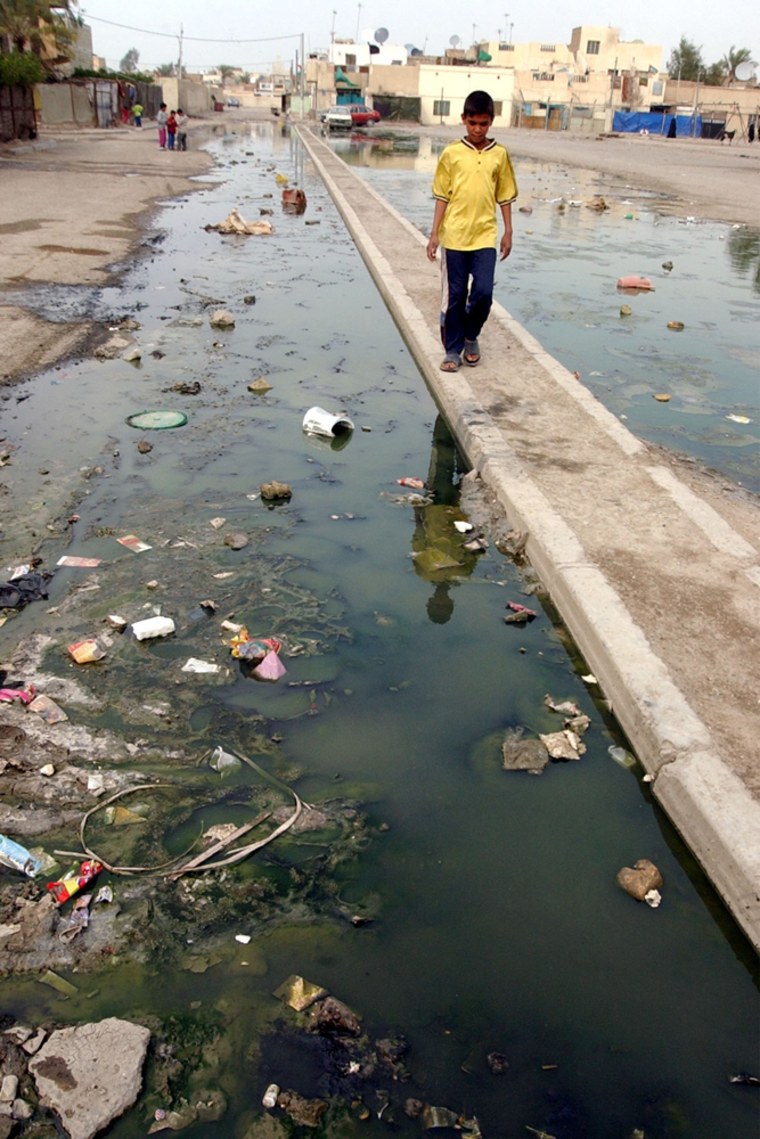Baghdad, whose name means the “Garden of God,” has fallen from grace. Known for centuries as one of the most beautiful cities in the world, its landscape has been marred by concrete blast walls, barbed wire, steel barricades, sandbags and crumbling buildings pockmarked by bullet holes or gutted by explosions.
Things have gotten so bad that the Iraqi capital has dropped to the bottom of a quality of life survey of 215 cities conducted by the London-based Mercer Human Resource Consulting.
“We used to be under sanctions and the economic conditions were dire, but never was the city so ugly. Between the chopped trees and the burned houses, it’s a total mess,” said 61-year-old Fadhila Dawoud, a teacher who used to take her students on picnics along the banks of the Tigris. Now they hold picnics in the school courtyard.
That could change if the mayor has his way and if the government comes through with promised funds. Work has already started in some areas, where residents are rebuilding homes and shops.
Once dubbed the “City of Peace,” Baghdad was founded in the eighth century by Caliph Abu Jafar al-Mansur as the capital for his rising Muslim Abbasid empire. The city soon became the heart of medieval Muslim civilization — a center of arts, culture and architecture.
Surviving Mongols, Ottoman — and Saddam
Forming half-circles on the two sides of the Tigris, its suburbs, parks, gardens, mosques and marble mansions earned it the reputation as the richest and most beautiful city in the world.
Since then, Baghdad has survived the 13th-century mayhem inflicted on it by the Mongols, the 16th-century marginalization by the Ottomans and two decades of war and sanctions under ousted dictator Saddam Hussein.
Saddam himself didn’t help with beautification — most of the apartment complexes, government buildings and palaces built under his orders would not have won any architecture prizes. And then there were the dozens of statues and oversized portraits of the Iraqi leader that decorated those buildings.
After the U.S.-led invasion in March 2003, the city of 5 million became one large military barricade: Humvees and tanks roaming the streets, helicopters rattling above, checkpoints and soldiers everywhere.
A two-year insurgency attacking homes and government buildings compounded the scars on the city’s face, undermining its ailing infrastructure and tattering the remaining grace.
Beautiful date palm groves that lined the 10-mile-long airport road — a visitor’s first impression of Baghdad — had to be removed to prevent gunmen from hiding in what has become one of the city’s most dangerous battlefields.
The rampant lawlessness has also encouraged people to take over buildings previously occupied by government offices and construct squatter settlements.
No direction ‘home’
Even democracy has taken its toll on Baghdad. Posters and banners of candidates running in the landmark Jan. 30 elections — a collage of mismatching colors — are still plastered everywhere, tainting traffic circles and walls two months after the vote. Huge black banners of religious invocations and photos of Shiite saints — a breakthrough for the country’s majority Shiites oppressed under Saddam — are randomly scattered around the city.
Alaa Kadhim, a 25-year-old janitor, said, “It looks so different today — the streets, the buildings, everything.”
“I lived all my life here, but it’s like someone has taken the feeling of ’home’ away,” Kadhim said, complaining about the ubiquitous blast walls.
Mayor Alaa al-Tamimi has made it his mission to bring back the city’s former glory.
After taking office last year, al-Tamimi “relentlessly nagged” coalition officials to remove the security barriers and open blocked roads, said his spokesman, Amir al-Hassoun.
Fraction of needed money in hand
The city also has many beautification and reconstruction plans awaiting funding. But al-Hassoun said the interim Iraqi government has given the city just $85 million of the $1 billion it requested — enough to begin tackling major infrastructure problems only.
The security situation has also denied residents access to many parts of their city, including the heavily fortified Green Zone that houses U.S. and Iraqi government offices. A virtual fortress, the four-square-mile area is encircled and crisscrossed by 12-foot-high barricades. Its gates are guarded by U.S. Bradley fighting vehicles aimed at passing traffic.
The U.S. military said it realizes the city has suffered but that the measures were necessary.
“Any soldier of Task Force Baghdad would concede the point that concrete blocks, blast walls and barbed wire are ugly security tools that detract from the beauty of any city,” said Army Lt. Col. Cliff Kent. “However ... (they) have been important tools in providing secure environments.”
A janitor's hope
Coalition troops have taken steps toward rectifying the damage. Last year, before the handover of sovereignty to the interim Iraqi government, the Coalition Provisional Authority allocated $10 million for beautification projects. The plan included creating parks, erecting sculptures, landscaping and repairing sidewalks.
Scores of Iraqis in orange jumpsuits already have been redesigning the eastern bank of the Tigris along Abu Nawas street, and hammering and the screech of saws can be heard throughout the city — signs residents are beginning to rebuild.
Kadhim, the janitor, said he’s hopeful Baghdad will reclaim its beauty.
“Maybe when a new government is formed and things are more stable, these walls will fall, and Baghdad would be free,” he said.
